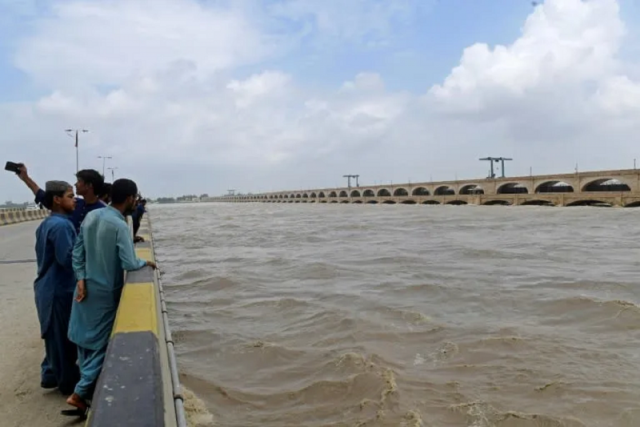‘India floodwater’ caused no harm
Senate told neighbouring country obliged under water treaty to forewarn before releasing floodwater

The Senate was told on Tuesday that India was obliged under an agreement to forewarn Pakistan before releasing a gush of floodwater in the Pakistani rivers and that no harm was caused by the water released by the neighbouring country during the recent monsoon season.
Speaking on the floor during the question hour, Adviser to Prime Minister on Kashmir and G-B Qamar Zaman Kaira informed the upper house that during the current monsoon season, a flood alert was reported in Indian media regarding the release of 200,000 cusecs flows in the river Ravi.
Alarmed by the reports, Pakistan Commissioner for Indus Waters (PCIW) had reached out to the Indian Commissioner for Indus Waters (ICIW) on July 31, 2022, to confirm the veracity of the news and asked for further information regarding the discharge so as to be able to take preventive measures in Pakistan.
In his response on August 1, the ICIW informed about a flow of 140,000 cusecs likely to be released in the Ravi river downstream of Ujh Barrage. Later, however, the flows observed and reported by Pakistani Punjab Irrigation Department in the river at Jassar were recorded at 33,850 cusecs.
Similarly, in another instance, information was also shared with Pakistan on August 15 about an imminent release of 171,797 cusecs water downstream of Ujh Barrage in the Ravi river.
The corresponding river flows observed and reported by Punjab Irrigation Department in Ravi at Jassar was 63,720 cusecs.
The Ujh Barrage over the Ujh river – a tributary of the Ravi river that flows through the Kathua district – is located at Jasrota village in the Indian Illegally Occupied Jammu and Kashmir (IIOJK). The water reaches Pakistan via Jassar village in the Narowal district of Punjab.
Kaira said the information shared by India in the two instances was shared by the office of PCIW with all the quarters concerned for taking preventive measures, including the flood forecasting division, and federal and provincial flood disaster and response agencies.
Meanwhile, the Senate was informed that the government has allocated funds to the tune of Rs362.6 million for the National Disaster Management Authority (NDMA) as a regular budget for the fiscal year 2022-23.
Moreover, an additional amount of Rs8 billion has been allocated to the disaster management authority in view of the recent devastating monsoon flood.
Speaking on the floor of the Senate, during question hour, Minister of State for Law Shahadat Awan said from 2018 to 2021, the NDMA has been managing multiple man-made and climate-induced disasters including heavy rains, snowfall, flash floods, hill torrents, glacial lake outburst floods, urban flooding, tropical cyclones and earthquakes in AJK, Balochistan and Gilgit-Baltistan.
In addition, the authority was also invested in responding to two major national and international emergencies namely locust swarms and the Covid-19 pandemic.
Based on the PMD forecast, the minister said monsoon contingency plans were prepared at the national, provincial and district levels.
“Monsoon seasons from 2018 to 2021 saw climate change-induced impacts ranging from flash floods, hill torrents, cloud bursts, and glacial lake outburst floods to urban flooding with the latter being the most recurrent theme in recent years,” he said.
Highlighting the steps taken to tackle the hazards of monsoon, he shared that meetings were being held before the onset of the season and contingency plans were issued to all stakeholders.
National Emergency Operations Centre (NEOC) and Army Flood Control Centre (AFCC) have been also activated for round-the-clock monitoring of developing situations in the country, he informed.



















COMMENTS
Comments are moderated and generally will be posted if they are on-topic and not abusive.
For more information, please see our Comments FAQ